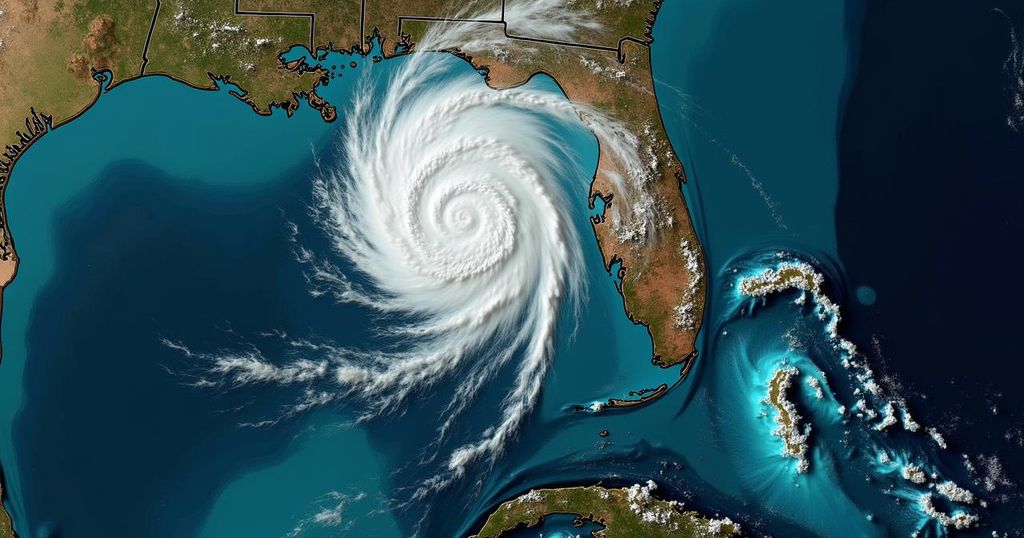Hurricane Helene’s Impact on Florida: A Comprehensive Overview
Hurricane Helene made landfall in Florida as a Category 4 storm before weakening to a tropical storm. At least 105 fatalities have been reported, with significant power outages and damage throughout the southeastern U.S. Emergency declarations were made across several states as rescue efforts commenced. Federal assistance has been approved to aid recovery efforts. The storm underscores the severe impact of hurricanes in vulnerable coastal regions.
Hurricane Helene made landfall on Thursday night as a powerful Category 4 storm, impacting Florida’s Big Bend region. As the storm diminished into a tropical system by Friday morning, its remnants moved into Kentucky. Tragically, the storm has been linked to at least 105 fatalities, with 13 confirmed deaths in Florida alone, including 10 in Pinellas County, two in Hillsborough County, and one in Dixie County. The storm struck approximately 10 miles west of Perry, Florida, at 11:10 p.m. EDT on Thursday, leading to significant power outages that affected more than 1 million homes and businesses throughout Florida, and many more across Georgia, Virginia, and the Carolinas as well. Emergency declarations were issued by the governors of Florida, Georgia, Alabama, South Carolina, North Carolina, and Virginia. While the storm affected a less populated area, its fallout was felt hundreds of miles away, with severe flooding reaching North Carolina. Reports and videos from Perry highlighted significant rain and damages, such as the peeling of the new roof at a local church, which had undergone renovations following a previous hurricane. Governor Ron DeSantis remarked on the extent of the damage, stating that it appears to surpass the combined effects of Hurricanes Idalia and Debby from the prior year, which he described as deeply disheartening. In response to the crisis, President Joe Biden expressed his condolences for the affected citizens while deploying the Federal Emergency Management Agency (FEMA), which has already sent over 1,500 personnel to aid in rescue operations, completing approximately 400 rescues by Friday morning. There were urgent warnings issued regarding the dangers of flooding and debris in the water, encouraging individuals stranded to await trained assistance rather than attempting to navigate the waters themselves. Law enforcement and rescue teams have been actively searching for individuals affected by the flooding, with missions ongoing across impacted counties. Governor DeSantis had previously declared a state of emergency for the majority of Florida’s counties, and President Biden subsequently approved a federal disaster declaration, allowing for further resources to assist in recovery efforts. As preparations for disaster relief were made, national guard units were activated to provide additional support.
Hurricane Helene’s influence on Florida serves as a pivotal reminder of the destructive potential of severe weather systems. While the storm made landfall as a Category 4 hurricane, it quickly transitioned into a tropical storm but left a significant trail of destruction in its wake. The devastation highlighted the vulnerabilities of communities, particularly in coastal regions, to extreme weather, affecting infrastructure, power supply, and safety. Furthermore, the response by federal and state authorities underscored the importance of preparedness and rapid mobilization to assist affected populations in the historically hurricane-prone areas of the southeastern United States.
Hurricane Helene’s landfall and subsequent dissipation underscore the devastating impact of tropical storms, even after they have weakened. The loss of life and widespread destruction necessitate a swift and robust response from government officials and emergency services. Continued vigilance and recovery efforts remain critical as Florida and its neighboring states work to overcome the challenges posed by such formidable weather events. As communities begin to heal, the collaborative efforts of governmental agencies and citizens will be essential in rebuilding and reinforcing resilience against future storms.
Original Source: www.cbsnews.com




Post Comment